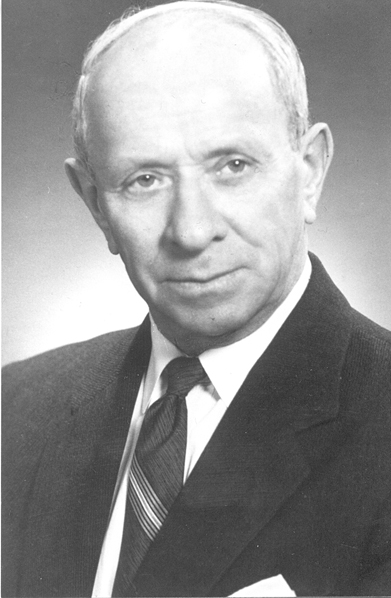Tribute to the Longest
Serving President of UNF of Canada
40th
Anniversary Commemorating the Passing of Wladimir Kossar
By
Mary Pidkowich
This
article is for the readers of today’s generation to become acquainted with
Wladimir Kossar, former President of the Ukrainian National Federation of
Canada, by mentioning briefly his life in Ukraine and Canada, and his dedicated
efforts and work for the Ukrainian community in Canada and people in Ukraine.
ladimir Kossar was born on November 23, 1890 in
Rusyliv, Ukraine.
After the First World War, he was a brigadier in command of Ukrainian troops
fighting the Bolshevik forces in 1919-1920. Although defeated by the
Bolsheviks, many of these veterans continued the struggle for Ukraine’s
independence. For his activities in the clandestine Ukrainian Military
Organization (UVO), Mr. Kossar was sent to a Polish prison. After a
brief period of incarceration, he was fortunate enough to escape to Czechoslovakia.
In 1922, Wladimir married Franka (Frances) Jaksh in Prague.
Before coming to Canada, Mr. Kossar worked as a superintendent of agricultural
schools and professor at the Pedagogical Institute, Ministry of Agriculture in
Uzhorod, Carpatho-Ukraine.
On May 7, 1927,
Wladimir Kossar, along with a group of ten university graduates (Engineers of
Agriculture) came to Quebec.
Their destination was Western Canada.
Wladimir’s decision to come to Canada
was based on not only to start a new life but to enter an independent
occupation – the work of a Canadian farmer.
Kossar’s Impression of Canada
Travelling by train from Quebec to
Winnipeg,
Wladimir was overwhelmed to see vast uninhabited territory, rocky sections in Northern
Ontario and huge farms with machinery. Most of all,
he noticed the lack of police interference with Canadian people and especially
with new immigrants. Arriving in Winnipeg,
the group of students was confined to the Immigration Hall. However, Mr. Kossar
was granted leave and met some Ukrainians, including two editors of Ukrainian
newspapers. Wladimir also had the opportunity to visit the Ukrainian Labour Temple,
where he was bitterly disappointed to see pictures of Lenin and Trotsky. It was
difficult for him to find out that some Ukrainians in Canada
were propagating destructive Communist doctrines.
Farming
Returning to the Immigration Hall, Mr.
Kossar found out that the others in the group left for various points on the
Prairies. The immigration officer suggested that he stay in Manitoba
and work for a Ukrainian farmer. However, Wladimir’s preference was to go to Saskatchewan
and work in an English speaking district and learn the language of his new
country. Thus, on May 15, he arrived in Macklin, Sask. to
work for a farmer who was a WWI veteran from Britain.
Mr. Kossar was also happy to learn that two of his companions were assigned to
work on neighbouring farms.
Only after securing
employment, Wladimir was allowed to bring his wife Franka to Macklin who arrived
on August 17, 1927,
just before the harvest. Both worked on the farm under severe weather
conditions and stayed in Winnipeg
during the winter, returning in the spring to the farm in Macklin. Wladimir’s
earned wages gave him an opportunity to buy his own farm near Saskatoon,
today’s airport. Unfortunately, because of the Great Depression, the Kossars
were forced to give up the farm in 1934.
University Years
As an agrologist who applied soil science in
the production of crops, Wladimir Kossar worked 8 years as a researcher at the
Dominion Laboratory of Plant Ecology, University
of Saskatchewan.
He also spent time on weed research and other ecological studies with Dr. T. K.
Pavlychenko, under the direction of Dean L.E. Kirk and later under I. B.
Harrington, Professor of Field Husbandry. In 1943, Mr. Kossar left his
university post and went to Winnipeg to
devote his efforts to the Ukrainian National Federation and continue as
National President. He also became the Agricultural Editor of “Novyi Shliakh” -
The New Pathway, founded in 1930 providing Ukrainian immigrants
newsworthy articles about life in Canada
and Ukraine.
Organizational Activities in Canada
Wladimir Kossar was well-known for his
organizational activities in Canada.
He was instrumental in the formation of the Ukrainian Canadian Relief Fund, Oseredok
– Ukrainian Cultural and Educational Centre, and the Ukrainian Canadian
Committee for which he served as Vice President for many years. He was also an
executive member of the Empire Club, member of the Agricultural Institute of
Canada, Manitoba Institute of Agrologists, Canadian Club and Royal Canadian
Legion (BESL).
Tributes include the
1953 Coronation Medal; 1967 Centennial
Medal “In recognition of valuable service to the nation”; Wladimir Kossar Scholarship
Fund at the University
of Manitoba;
the W. Kossar Ukrainian Village, a senior's home sponsored by the UNF Vernon
Branch officially opened in June 1975; and the Public Archives of Canada in Ottawa
which house the Kossar Papers.
Wladimir Kossar passed away
on May 11, 1970 in
St. Catharines,
Ont. His resting place is at Victoria Lawn Cemetery.
The double burial plot was generously provided by the UNF St. Catharines
Branch. Mr. Kossar will always be remembered for his out-going personality and
his dedication to the UNF. He encouraged all members to be respectful, good
workers and good citizens of Canada.
By following his example, may we continue to work together for the good of our
community in Canada
and support democratic principles and human rights in Ukraine.
Even with his many
responsibilities, Mr. Kossar took an avid interest in his children’s education,
in which Ukrainian culture and traditions remain as cornerstones of their
lives. He is survived by his daughter Mrs. Alma Bilak (Jaroslaw), daughter-in-law
Zena (Leon deceased), and four grandchildren and 10 great grandchildren.
Mary Pidkowich is former President of the
Ukrainian National Federation of Canada
and Honorary Member of the UNF Board of Directors.

